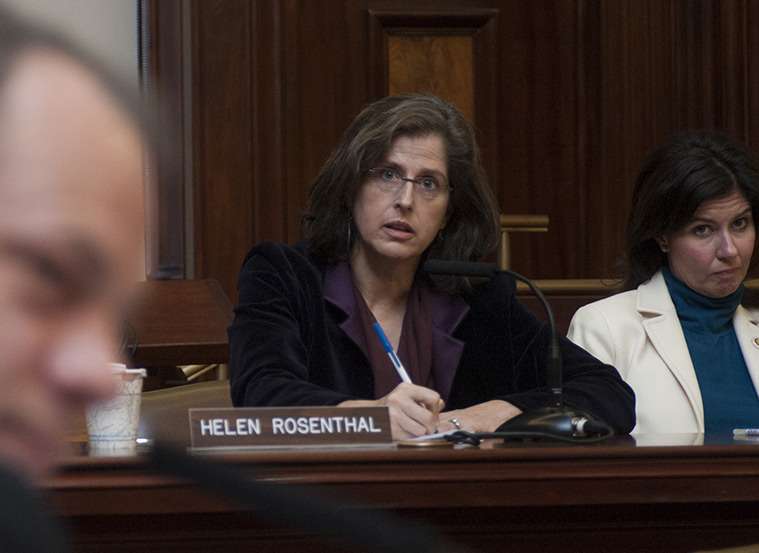New York City's Affordable Housing Bonanza for the Rich
Housing subsidies go to families making up to $193K.
It's no secret that one-percenters have occupied more than their share of Manhattan's rent-controlled apartments. High profile freeloaders of the past include New Yorker editor William Shawn, singers Carly Simon and Cyndi Lauper, TV personality Alistair Cooke, Metropolitan Museum of Art Director Philippe de Montebello, former Kennedy speechwriter Ted Sorensen, screenwriter Nora Ephron, Mick Jagger's ex, Bianca, and Mayor Ed Koch (D). Manhattan Congressman Charlie Rangel (D-13th District) famously pigged out on four rent-controlled pads—three to live in and one for his campaign office.
Fans of Woody Allen's film Hannah and Her Sisters (1986) may recall the 11-room apartment where Elliot and Hannah reside. That's actress Mia Farrow's actual rent-controlled apartment, passed down from her parents—and did I mention that it's on 73rd Street overlooking Central Park? Even free-market heavyweights Murray Rothbard and Robert Nozick partook in the spoils of a law that made housing artificially cheap through state coercion. (A disclosure: I grew up in a way below-market rent-controlled home on Manhattan's Upper West Side with four bedrooms and panoramic views of the Hudson River in a building filled with upper middle class professionals with similar deals.)
Rent control laws[*] were intended to protect poor New Yorkers from rapacious landlords, but in practice they disproportionately benefit the well-to-do, who are more likely than the poor to remain for decades in apartments that become increasingly underpriced as the years go by.

A similar dynamic has taken hold of the latest fad in real estate market interference, "affordable housing," an arrangement in which developers receive substantial government subsidies, mainly through a complex array of tax gimmicks, and in return agree to rent (or sell) apartments at below-market prices. In May, New York City Mayor Bill de Blasio (D) unveiled a plan to build 80,000 new affordable housing units, "marshaling every corner of government and the private sector," he boasted, "in an unprecedented response" to the city's "crisis of affordability."
De Blasio, who ran on a promise to reduce inequality, is now enabling upper middle class New Yorkers to tap into these subsidies to serve their housing needs. In a city in which one in five households lives below the poverty line, spending limited government dollars so professionals earning six figures don't have to leave their favored neighborhoods is obscene.
Take Manhattan's 606 West 57th Street, a 1,025-unit building to be put up by developer TF Cornerstone. In exchange for setting aside 220 of those apartments for "lower income" tenants, the developer will get a local real estate tax exemption, tax-exempt financing, Low Income Housing Tax Credits (in which banks kick in equity in exchange for a tax rebate), and permission to build a larger building than the zoning

code would otherwise allow.
The kicker is that some of these "lower income" families are wealthy by most standards. The 220 affordable apartments will be split up among households of four earning no less than $50,300 and no more than $193,000 per year—or nearly four times New York City's median household income, which was $50,895 in 2012.
City Council Member Helen Rosenthal (D-6th District), a liberal from Manhattan's Upper West Side, negotiated with TF Cornerstone to increase the income eligibility limits (i.e. keep the poorer people out) in exchange for a promise to build a preschool and to add 15 more affordable units. Ryan Hutchins of Capital New York recently interviewed Rosenthal about the deal, which she defended on the grounds that "we need more affordable housing—more affordable housing for everyone." According to Rosenthal, "p

art of the role of the Upper West Side, is to serve as a gateway to the middle—to the American aspiration."
"You know, from my perspective, what makes the Upper West Side the Upper West Side is that, 20, 30 years ago, a bunch of sort of lower-middle income families and individuals took a risk on the Upper West Side, settled this community and made it the community that it is today," Rosenthal said. "And the city, I think, has an obligation to find a way for these people to stay on the Upper West Side and not let it turn into a community that's very wealthy."
Rosenthal's comments remind me of the great 2008 article in The Onion, "Nation's Gentrified Neighborhoods Threatened by Aristocratization," which quotes a fictitious housing expert named Maureen Kennedy: "When you have a bejeweled, buckle-shoed duke willing to pay 11 or 12 times the asking price for a block of renovated brownstones—and usually up front with satchels of solid gold guineas—hardworking white-collar people who only make a few hundred thousand dollars a year simply cannot compete…"

Affordable housing for the six-figured isn't limited to Manhattan's "gateway to the middle." Last week, New York Gov. Andrew Cuomo (D) and Mayor de Blasio struck a deal with developer Forest City Ratner to expedite the building of two "affordable" buildings at Brooklyn's Atlantic Yards, the crony capitalist oasis that used the threat of eminent domain for land acquisition. (See "The Great Basketball Swindle," Reason, October 2011.) The deal stipulates 300 of the 600 new apartments in the two buildings will go to families of four earning up to $142,000.
Journalist Norman Oder, the tireless watchdog who has devoted the last eight years to dissecting every buried detail and broken promise at Atlantic Yards, points out that housing for families that make up to $142,000 a year isn't what was sold to the public back in 2005, when the low-income advocacy group ACORN was rallying support for the project on the grounds that Atlantic Yards would help poor families stay put in a rapidly gentrifying area.
Oder also dug up this gem from Mayor de Blasio's days as a city council member:
In an interview in 2007, when asked if those earning six figures should get subsidized housing, [then Council Member] de Blasio responded, "Definitely below six figures. Absolutely below six figures. Over eighty [thousand] I don't think is what I'm thinking about, although there may be some exceptions."
De Blasio is a longtime supporter of Atlantic Yards, and his wife just selected the project's developer Bruce Ratner to be on the board of the Mayor's Fund to Advance New York City, where he'll be well positioned to ask for special favors down the line.
In the posh Manhattan neighborhood of Chelsea, developer Related Companies is building 529 West 29th Street, a 139-unit affordable housing development, 70 percent of which will be awarded to New Yorkers who work in the "performing arts." The maximum household earnings for families of four will be capped at around $51,000, while singles can make no more than $36,000 a year—figures that roughly match New York's median salaries.
Why is it in the nation's interest to spend federal dollars so arts industry folks can reside in one of the world's most expensive neighborhoods? Why don't affordable housing set-asides ever go to back-kitchen restaurant workers, house cleaners, or car wash employees? The answer: Those jobs aren't a stepping stone to more lucrative
employment, so they don't appeal to college-educated elites.
The Chelsea building will be subsidized through both tax-exempt bonds and Section 8, a federal program intended to help the poor. The building's financing is modeled after that of Manhattan Plaza, a Section 8 affordable housing development in midtown that's also for employees of New York's performing arts industry. (Manhattan Plaza is best known as former home to Seinfeld creator and comedian Larry David, who lived across the hall from an oddball named Kenny Kramer.)
Last year, according to information obtained through a Freedom of Information Act request, the U.S. Department of Housing and Urban Development (HUD) paid Related Companies $31.8 million to subsidize the rent of 1,355 apartments at Manhattan Plaza, which works out to $24,000 per unit annually.
To those "young white professionals" with only "modest trust funds" feeling priced out of "the nation's gentrified area" by "powder-wigged aristocrats," (again I'm quoting that great piece in The Onion) I feel your pain. But leave the affordable housing subsides for people who are actually poor.
[*] I'm using rent control as a blanket to term to include the more prevalent "rent stabilization laws" that took effect in 1969.
An earlier version of this article stated incorrectly that two buildings at Atlantic Yards will go to households of four earning more than $142,000. Those units have been set aside for households making up to $142,000.
Editor's Note: As of February 29, 2024, commenting privileges on reason.com posts are limited to Reason Plus subscribers. Past commenters are grandfathered in for a temporary period. Subscribe here to preserve your ability to comment. Your Reason Plus subscription also gives you an ad-free version of reason.com, along with full access to the digital edition and archives of Reason magazine. We request that comments be civil and on-topic. We do not moderate or assume any responsibility for comments, which are owned by the readers who post them. Comments do not represent the views of reason.com or Reason Foundation. We reserve the right to delete any comment and ban commenters for any reason at any time. Comments may only be edited within 5 minutes of posting. Report abuses.
Please to post comments


But he's a democrat, so it's all right.
If you think Patrick`s story is impressive..., five weaks-ago my son in law earnt $8989 workin 40 hours a month from their apartment and the're neighbor's mom`s neighbour done this for 3 months and made more than $8989 parttime on there pc. apply the guidelines on this site works33.com
(Go to site and open "Home" for details)
Dear Reason,
Why do you always have a news post at 4:31pm? Don't you realize that everyone's on the PM links post for at least a half-hour starting at 4:30? The chances are by the time they're done with PM links, the 4:31 post seems old, and, no doubt, too often gets skipped by us readers.
If I wrote a piece and it ended up in the 4:31 slot I'd be pissed. Why not save it for the weekend, when we're always starved for new threads?
So, a state enforced program "for the poor" primarily benefits the wealthy people who championed it. This should surprise nobody. This is how state charity almost always works. It works this way under a monarchy, in an aristocracy, in a putative democracy, and under communism.
When you see a man coming down the street with the obvious intention of doing you good, you should run for your life.
- Mark Twain
This is great!
Once again, the Onion mirrors reality. Those quotes could have come from a recent issue of the Post.
Yesterday Tony assured us that subsidies decrease demand.
If you like the slum you live in you can keep it. If you like the posh neighborhood you are already living in you can keep living in it.
If you want to move to a nicer neighborhood than your current one, do it on your own dime.
But without subsidies, how can I afford my gold-plated monocles? It would be unjust for them to deny me access to my monocles!
I'll give you some of mine. Without constant polishing by child laborers, they are essentially worthless.
The exact same phenomenon has happened here in Santa Monica. Well-to-do professionals and "artists" living in ridiculously priced, subsidized units close to the beach. The pols don't even try to pretend that rent control benefits the poor anymore. As the article points out, the new cause du jour is "affordable housing."
Thanks for this piece, Jim. It explains why in 1988 when I ran for the NYS assembly from the Bronx (looks like I am again this year) at a candidates' forum there was a woman who asked us very insistently, "What is `affordable housing'?"
Or, affordable for exactly who?
I think it's kind of like "affordable care."
But how would have Friends have got off the ground if Monica hadn't squatted in her grandmother's apartment?
See? Rent control like totally works.
I don't think income equality means what they think it does...
Socialism is for the people, not the socialist.
As bad as rent control is, why are the rich "more likely than the poor to remain for decades in apartments that become increasingly underpriced as the years go by"?
Oh, and fuck Bruce Ratner.
"As bad as rent control is, why are the rich "more likely than the poor to remain for decades in apartments that become increasingly underpriced as the years go by"?"
Those units NEVER hit the market; they are privately 'sold' to the highest bidder when they do change hands.
So, natch, the well off end up with them.
Also, the poor either live in projects or cram lots of people into illegally subdivided apartments. They generally don't have access to either rent regulated apartments (which tend to start at market rates the first time you move in) or "affordable housing" (which is only available to the connected and to lottery winners).
The next person who says "one percenter" is going to get pistol whipped.
Me: "Hey Micheal! What's that group you denied being a part of at OWS? You know, the group that wears all the monocles?"
Micheal Moore: "The One Percent?"
Me: Hands pistol to Marktaylor
SF isn't about to fall behind in derp, so we have 'rent control' here also. It has cut inventory by quite a bit and forced non-controlled rent through the roof (and rents can rise to market when there is a vacancy).
Of course, the left goes bat-shit crazy when anyone suggests repeal, and it's always fun to link this:
"On the other side, consider an article that appeared in yesterday's New York Times, ''In San Francisco, Renters Are Supplicants.''"
http://www.nytimes.com/2000/06.....ffair.html
Krugman wrote that?! What happened to that guy?
Before he fell totally down the lefty rabbit hole, he did some decent econ.
By now, he's stuck defending crap he's published over the last ten years.
Rent control is evil.
Such an amazing and marvelous hotel with the best-est of architecture and the perfect stylish and art crafted wall designs perfect for those considering an extended stay hotels.
affordable housing rental for student in New York